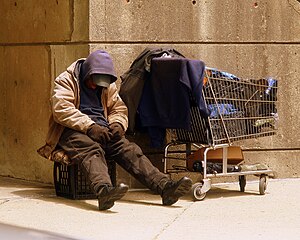Among Needs Of Homeless Veterans: Legal Assistance
They came home, but they have no home.
Although homelessness is a sad thing in any segment of the population, from children to families to people with mental health problems, it is especially sad to see it among military veterans, and depressingly prevalent among returning soldiers, sailors and Marines.
 Fortunately, the Veterans Administration, not always the most responsive agency in the federal government, has recognized this as an issue and has taken steps to help homeless veterans.
Fortunately, the Veterans Administration, not always the most responsive agency in the federal government, has recognized this as an issue and has taken steps to help homeless veterans.
While shelter is obviously their biggest unmet need, many among the legions of homeless former warriors also need legal assistance.
Again, the VA has stepped up to the plate on this.
The Department of Veteran Affairs in 2011 issued a directive designed to provide adequate legal referrals to veterans who are homeless.
“The President and the Secretary of Veterans Affairs have established a goal of ending homelessness among Veterans by 2015,” the background on the director states. “Veterans’ lack of access to legal representation for outstanding warrants or fines, as well as for child support and other legal matters, contributes significantly to their risk of becoming homeless.
“In response to these unmet needs, several VHA facilities have been referring homeless veterans to local legal service providers or referral services, such as those operated by the state or local bar associations. A task force of homeless programs staff from the VHA and the Office of Policy and Planning, as well as the Office of the General Counsel, has recommended that the Department of Veterans Affairs establish nationwide legal referral policies to ensure that referrals are being made in a consistent manner.”
A key to this whole policy, and to the overall and lofty goal of ending homelessness among former service men and women is that it’s not just left out there as words on paper.
“The National Coordinator, Veterans Justice Outreach, is responsible for the contents of this directive,” the document states.
In other words, someone is made responsible for seeing that actions are actually taken.
